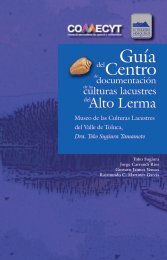You also want an ePaper? Increase the reach of your titles
YUMPU automatically turns print PDFs into web optimized ePapers that Google loves.
KORPUS <strong>21</strong>, VOL. 2, NÚM. 4, 20<strong>21</strong>, 163-178<br />
Many Catholics associated soldiering with<br />
debauchery, gambling, and prostitution,<br />
and hoped to promote measures to mitigate<br />
these vices (Campos, 2012; Rath, 2019). After<br />
the government introduced conscription,<br />
Acción Católica Mexicana, with the approval<br />
of the archbishop of Mexico, organized<br />
groups of respectable young women to invite<br />
conscripts to attend mass. The group also<br />
set up a club near Mexico City’s barracks in<br />
which conscripts could safely socialize, eat,<br />
and listen to religious lectures on the weekends;<br />
the club in the Federal District had 127<br />
official members. ACM set up clubs across<br />
the country, and according to Rath, these<br />
clubs were even attended by priests in Guadalajara<br />
(Rath, 2013: 76).<br />
The UFCM also helped organize these<br />
clubs for young Catholic recruits. Their<br />
goal was to “to help morally and materially<br />
the young men in recruitment centers,<br />
quarters, or training camps”. In order to do<br />
so, they sought to make sure soldiers were<br />
able to practice their faith, by providing for<br />
“masses, retreats, catechisms…and religious<br />
instruction.” To aid this, they sought to organize<br />
and give away “collections of pious<br />
objects, like mass books, rosaries, medals,<br />
and stamps, in order to conserve piety in the<br />
young recruits”. In addition to these overtly<br />
religious goals, these women also sought to<br />
organize cultural and sports centers, as well<br />
as day and night courses that would include<br />
radio transmissions of concerts and cultural<br />
events. They also saw their work as providing<br />
material aid for families of recruits,<br />
such as clothes closets, and co-ops, as well<br />
as help defraying the expense of visits. Finally,<br />
they aimed to be a center that could<br />
provide social services to recruits, learning<br />
all they could about them and their families,<br />
in order to provide services “efficiently<br />
and with familiar communication.” For their<br />
UFCM members, they planned to organize<br />
a Red Cross course for emergencies and<br />
other training. These centers would provide<br />
for all the spiritual and recreational needs of<br />
Catholic soldiers (ACM, s.f.b).<br />
In order to accomplish these goals, the<br />
UFCM created a Women’s Civil Defense<br />
Service. In order to participate, women had<br />
to complete a survey and declare the following:<br />
“Declaración”<br />
(Servicio Civil Femenina de Defensa)<br />
I. I declare that, as a Mexican, or inhabitant of<br />
Mexico, I feel obligated to defend the liberty<br />
and honor of Mexico through any honest<br />
ways to achieve this.<br />
II. I declare that as a member of the community<br />
in which I live, I am obligated to work for its<br />
welfare and prosperity.<br />
III. I declare that as a conscientious element of<br />
humanity I am obligated to help others working<br />
for a solution to all social problems that<br />
weigh on us.<br />
IV. I declare that as a free and conscientious<br />
human I am obligated to fight for human liberty<br />
and decorum through an adequate civic<br />
education and the acts of defense against aggressive<br />
agents wherever they may be.<br />
Considering that the “Servicio Civil Femenina<br />
de Defensa” gives me the opportunity to work<br />
for these objectives, I accept inscribing myself<br />
in its membership and I have answered the attached<br />
questionnaire, that I will send to the<br />
Directing Committee (ACM, s.f.c).<br />
This declaration shows that for Catholic<br />
women, patriotism was infused with notions<br />
of honor, honesty, community and faith. Interestingly,<br />
women are called on to defend<br />
notions of country’s honor, which typically<br />
had been, as Amelia Kiddle convincingly argues,<br />
a male purview (Kiddle, 2015). Male diplomats<br />
often framed the defense of Mexico<br />
in terms of protecting the country’s honor,<br />
much like one would protect a woman’s honor.<br />
In a significant shift in roles, these Catholic<br />
women saw defense of honor to also<br />
be an obligation for women of faith. Women<br />
could also be protector and take an active<br />
role in defending the country. These women<br />
saw themselves as part of the larger community<br />
that required them to work towards<br />
solutions to social problems, and as part<br />
of humanity that required the fight against<br />
threats to liberty and decorum. Just as men<br />
served as soldiers, women also served their<br />
171



![bicentenario_1[V2]](https://img.yumpu.com/68677971/1/167x260/bicentenario-1v2.jpg?quality=85)

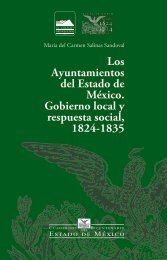

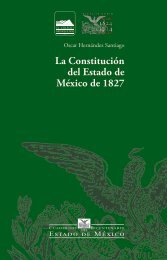
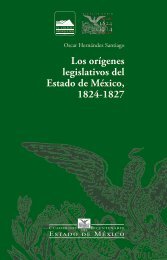
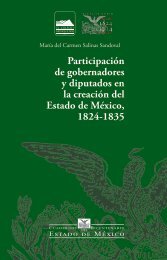
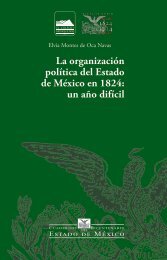


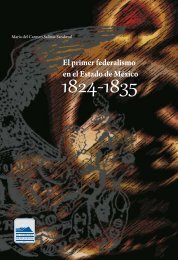
![El_primer_federalismoEM[final]_compressed (2)](https://img.yumpu.com/68483279/1/178x260/el-primer-federalismoemfinal-compressed-2.jpg?quality=85)

